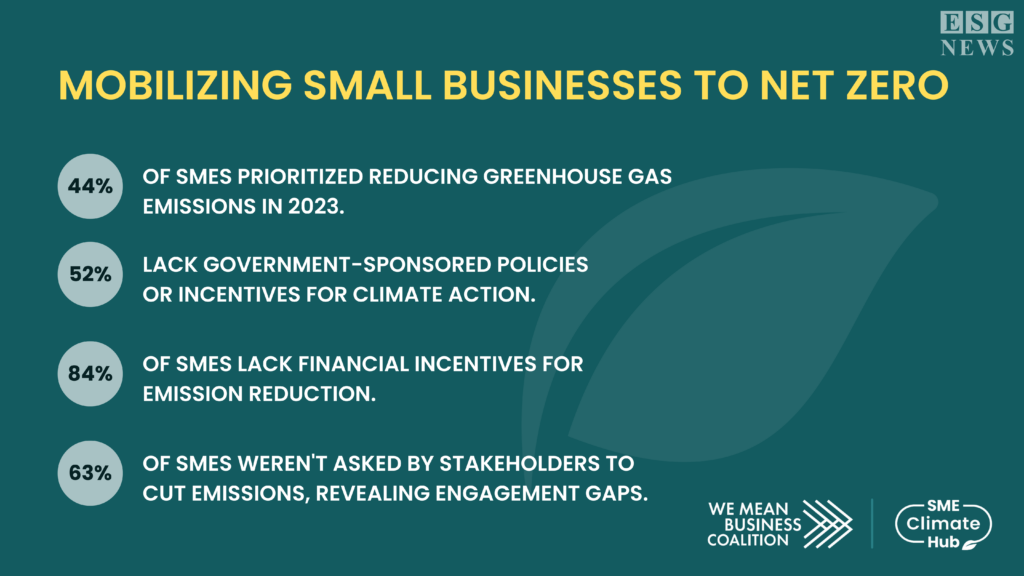84% of SMEs Have Not Received Any Financial Incentives to Reduce Emissions, Reveals We Mean Business Report

|
Listen to this story:
|
Key Impact Points:
- 44% of SMEs surveyed experienced an increased emphasis on reducing greenhouse gas emissions in 2023.
- 52% of respondents cited a lack of government-sponsored policies or incentives as a barrier to climate action.
- 84% of SMEs have not received any financial incentives to reduce emissions.
- 63% of SMEs haven’t been asked by stakeholders to reduce emissions, highlighting a potential gap in engagement.
Small and medium-sized enterprises (SMEs) are increasingly recognizing the urgency of addressing climate change, but a recent report sheds light on the significant hurdles they face in transitioning to sustainable practices. Titled “Mobilizing Small Businesses to Net Zero,” the report, released by SME Climate Hub (Funded by We Mean Business Coalition), offers data-driven insights into the challenges and opportunities for SMEs in the realm of climate action.
María Mendiluce, CEO of We Mean Business Coalition emphasized:
“There are approximately 400 million small and medium-sized businesses (SMEs) in the world today, making up 90 percent of businesses globally. In the EU, these companies account for two-thirds of private sector jobs and contribute to more than half of the total added value created by businesses. The US economy boasts around 30 million businesses with less than 500 employees, and these companies have created nearly two-thirds of net new private sector jobs in recent decades.
A significant percentage of these companies will be important for providing the products and workers needed to move the world from the fossil fuel-based economy to one powered by clean energy. As global regulations and customer expectations increase, SMEs are reaping business benefits of taking action. Meanwhile, with a more concentrated customer base, staff and localized supply” She Added
The report highlights a notable shift in priorities among SMEs, with 44% of surveyed businesses expressing a heightened emphasis on reducing greenhouse gas emissions in 2023. This reflects a growing awareness of the environmental impact of business operations and the need for decisive action.
Despite this increased focus, SMEs encounter barriers that hinder their ability to implement meaningful climate initiatives. According to the report, 52% of respondents cite a lack of government-sponsored policies or incentives as a significant obstacle. This highlights the critical role of supportive regulatory frameworks in driving climate action among small businesses.
Furthermore, the report reveals a concerning trend regarding financial incentives, with 84% of SMEs reporting that they have not been offered any incentives to reduce emissions. This underscores the need for governments and other stakeholders to provide financial support and incentives to encourage SMEs to adopt sustainable practices.
RELATED ARTICLE: JPMorgan, Citi, RBC Reach Agreement with NYC on Climate Finance Disclosures
Another key finding from the report is the gap in stakeholder engagement. While SMEs express willingness to take climate action, 63% of respondents have not been asked by stakeholders to reduce emissions. This suggests a potential disconnect between SMEs and their stakeholders in terms of climate priorities and engagement.
Sarah Goodell, founder of Autumn Dahlia Creative Services, underscores the business case for climate action, stating, “Taking action against climate change is not just an environmental necessity, it’s a smart business move and the right thing to do.” Goodell’s perspective highlights the dual benefits of sustainability, including enhanced brand reputation and cost savings.
Vishakha Vidhani, founder of Avyannaa, emphasizes the importance of clear policies and regulations in supporting small businesses’ climate goals. She notes, “Substantial initial investments are often needed to implement sustainable initiatives.”
The report provides valuable insights into the challenges and opportunities for SMEs in addressing climate change. Data-driven analysis reveals the need for supportive policies, financial incentives, and stakeholder engagement to empower SMEs to accelerate their transition to net zero. Governments, financial institutions, and corporate partners must collaborate to provide the necessary support and resources for SMEs to thrive in a sustainable future.
Download the Mobilizing Small Businesses to Net Zero report funded by We Mean Business Coalition to learn more.










